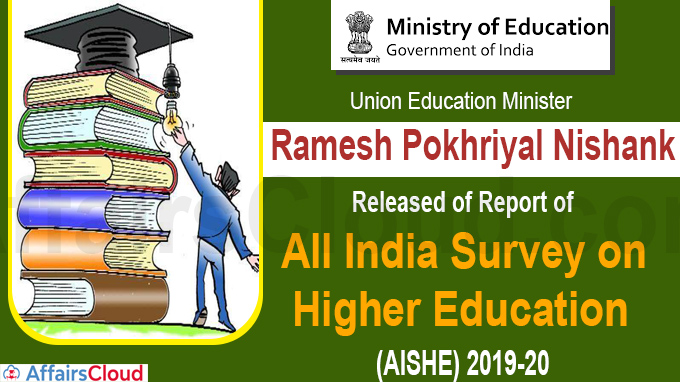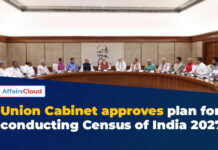 Union Minister for Education Ramesh Pokhriyal ‘Nishank’ released the report of All India Survey on Higher Education 2019-20 (AISHE 2019-20).
Union Minister for Education Ramesh Pokhriyal ‘Nishank’ released the report of All India Survey on Higher Education 2019-20 (AISHE 2019-20).
i.AISHE Report is released annually by the Department of Higher Education, Ministry of Education. It provides key performance indicators on the current status of Higher Education (HE) in India.
- AISHE 2019-20 is the 10th edition in the series of AISHE reports.
- It is a web-based survey that collects data through AISHE Portal based on parameters such as teachers, student enrolment, examination results, education finance, and infrastructure.
- Indicators of educational development such as Institution Density, Gross Enrolment Ratio (GER), Pupil-Teacher Ratio (PTR), Gender Parity Index (GPI), and Per Student Expenditure are calculated from the data.
Key Findings
The report states that in the last five years from 2015-16 to 2019-20, there was a growth of 11.4% in student enrolment. The rise in female enrolment in higher education during the period is 18.2%.
i.Total Enrolment in Higher Education
Total Enrolment in HE stands at 3.85 Crore (1.9 Crore Boys & 1.8 Crore Female) in 2019-20, a growth of 3.04% compared to 3.74 crores in 2018-19. Total enrollment was 3.42 crore in 2014-15.
- Females constitute 49% of the total enrolment.
- Uttar Pradesh comes at number one with the highest student enrolment followed by Maharashtra and Tamil Nadu.
ii.Gross Enrolment Ratio (GER)
GER in Higher Education in 2019-20 stood at 27.1%, compared to 26.3% in 2018-19 and 24.3% in 2014-2015.
- The GER for male population is 26.9 & for females, it is 27.3. For Scheduled Castes, it is 23.4 and for Scheduled Tribes, it is 18.0.
- GER is the Number of students enrolled in a given level of education, regardless of age. It is usually calculated for 18-23 years of age group.
iii.Gender Parity Index (GPI)
GPI in Higher Education in 2019-20 is 1.01 against 1.00 in 2018-19, which indicates an improvement in access to higher education for females of eligible age group compared to males.
- GPI is a socioeconomic index that measures the relative access to education of males and females.
iv.Pupil Teacher Ratio (PTR)
Pupil Teacher Ratio in Higher Education in 2019-20 is 26:1. PTR is the number of students who attend a school or university divided by the number of teachers in the institution.
- In 2019-20: Universities: 1, 043 (2%); Colleges: 42, 343 (77%) and stand-alone institutions: 11, 779 (21%).
v.Total Number of Teachers
- Total Number of Teachers stands at 15, 03, 156 comprising 57.5% male and 42.5% female.
vi.Analysis of Students enrolled in Higher Education
3.38 crore students enrolled in programmes at Undergraduate & Postgraduate level.
- Out of the 3.38 crore students, around 85% of students (2.85 crore) were enrolled in 6 major disciplines such as Humanities, Science, Commerce, Engineering & Technology, Medical Science and IT & Computer.
- The number of students pursuing PhD in 2019-20 is 2.03 lakh against 1.17 lakh in 2014-15.
vii.Institution density
The All India average of College density stands at 30. College density refers to the number of colleges per lakh eligible population. It varies from 7 in Bihar to 59 in Karnataka. Around 60.56% of Colleges in India are located in Rural Areas.
- Bengaluru Urban district, Karnataka tops in terms of most number of colleges (1009), followed by Jaipur, Rajasthan (606).
- The top 10 states in terms of higher number of colleges in India are Uttar Pradesh, Maharashtra, Karnataka, Rajasthan, Andhra Pradesh, Tamil Nadu, Madhya Pradesh, Bihar, West Bengal and Gujarat.
viii.Increase in Institutions of National Importance
The number of institutions of national importance have increased to 135 in 2020 from 75 in 2015 (80% increase).
Gist
| Indicator | Results (for the period 2019-20) |
|---|---|
| Total Enrolment in Higher Education | 3.85 Crore (Uttar Pradesh came at number one with the highest student enrolment followed by Maharashtra and Tamil Nadu) |
| Gross Enrolment Ratio(GER) | 27.1% |
| Gender Parity Index (GPI) | 1.01 |
| Pupil Teacher Ratio (PTR) in Higher Education | 26 |
| Institution Density | 30 |
About Ministry of Education
Union Minister – Ramesh Pokhriyal ‘Nishank’ (Haridwar, Uttarakhand)
Minister of State – Sanjay Shamrao Dhotre (Akola, Maharashtra)




